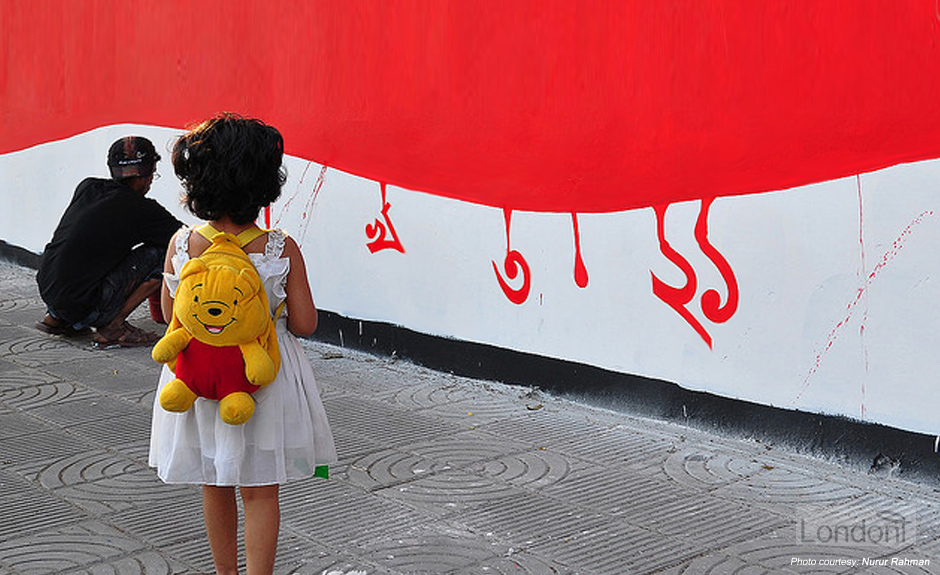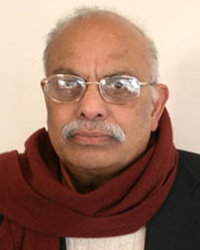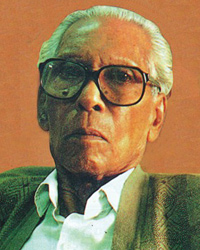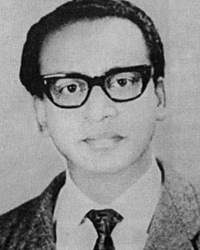
Amar Bhai'er Rokte Rangano Ekushey February
Last updated: 5 October 2017 From the section 1952 Bhasha Andolon
'Amar Bhai'er Rokte Rangano Ekushey February' (21st February - coloured with the blood of my brother) is a Bengali song - originally a poem - which was written by Abdul Gaffar Choudhury to mark the Bengali Language Movement in the 1950s in East Pakistan.
- Created by Abdul Gaffar Choudhury in 1950s
- Original music by Abdul Latif
- Official music by Altaf Mahmud
- First used in 1956
- Hasani? Didn't know that! The students of Dhaka College also sung the song when they attempted to build a Shaheed Minar on their college premises. For this action, they were expelled from the college. Abdul Gaffar Choudhury, a second year college student, wrote this song on the bedside of an injured language movement activist in Dhaka Medical College Hospital who was shot by the Pakistani military police.
In Bangla

Transliteration
Amar bhaiyer rokhte
rangano ekushey february
Ami ki bhulte pari
Cheleyhara shoto mayer osru
goraey february
Ami ki bhulte pari
Amar shunar desher
rokhtr rangano ekushey february
Ami ki bhulte pari.
Jago naginira jago
naginira jago
kalbosheykira
sishu ho'ita bikkobey aaj
kapuk boshundora,
desher shunar chele khun
kore rokhey manusher dabi
din bodler krantilogney
tobu tura par pabi?
Na, na, na, na khun ronga
itihashe shesh rai dewa
taroi
ekushey february ekushey
february.
Sheidin o amini nil
gogoner boshene shittyer
sheshey
raat jaga chad chumu
kayeychilo heshe;
In English
Can I forget the twenty-first of February
incarnadined by the love of my brother?
The twenty-first of February, built by the tears
of a hundred mothers robbed of their sons,
Can I ever forget it?
Wake up all serpents,
wake up all summer thunder-storms,
let the whole world rise up
in anger and protest against the massacre of innocent children.
They tried to crush the demand of the people
by murdering the golden sons of the land.
Can they get away with it
at this hour when the times are poised
for a radical change?
No, no, no, no,
In the history reddened by blood
the final verdict has been given already
by the twenty-first of February.
It was a smooth and pleasant night,
with the winter nearly gone
and the moon smiling in the blue sky
and lovely fragrant flowers blossoming on the roadside,
and all of a sudden rose a storm,
fierce like a wild horde of savage beasts.
Even in the darkness we know who those beasts were.
On them we shower the bitterest hatred
of all mothers brothers and sisters.
They fired at the soul of this land,
They tried to silence the demand of the people,
They kicked at the bosom of Bengal.
They did not belong to this country.
They wanted to sell away her good fortune.
They robbed the people of food, clothing and peace.
On them we shower our bitterest hatred.
Wake up today, the twenty-first of February.
do wake you, please.
Our heroic boys and girls still languish in the prisons of the tyrant.
The souls of my martyred brothers still cry.
But today everywhere the somnolent strength
of the people have begun to stir
and we shall set February ablaze
by the flame of our fierce anger.
How can I ever forget the twenty-first of February?
Translated by Kabir Chowdhury
The song is sung every year in the probhat feri, the morning march in barefoot towards the Shaheed Minar to pay homage to the martyrs.
 Abdul Gaffar Choudhury (Born 1937) Bangladeshi author and columnist who wrote the poem "Amar Bhaier Rokte Rangano" commemorating Language Movement. Awards include Swadhinata Purushkar (2009), Ekushey Padak (), Bangla Academy Award (1967), and UNESCO Award, amongst others. Strong supporter of Sheikh Mujibur Rahman. Settled in London, UK, in 1974. Born in Ulania, Barisal.
Abdul Gaffar Choudhury (Born 1937) Bangladeshi author and columnist who wrote the poem "Amar Bhaier Rokte Rangano" commemorating Language Movement. Awards include Swadhinata Purushkar (2009), Ekushey Padak (), Bangla Academy Award (1967), and UNESCO Award, amongst others. Strong supporter of Sheikh Mujibur Rahman. Settled in London, UK, in 1974. Born in Ulania, Barisal. Abdul Latif (1930) Singer and musician who composed the original music of "Amar Bhaier Rokte Rangano". Born in Raipasha, Barisal.
Abdul Latif (1930) Singer and musician who composed the original music of "Amar Bhaier Rokte Rangano". Born in Raipasha, Barisal. Altaf Mahmud (1930 - 1971) Musician and cultural activist. Composed the official music of "Amar Bhaier Rokte Rangano" in 1969, Zahir Raihan’s film "Jibon Theke Neya". Awarded Swadhinata Purushkar (2004) and Ekushey Padak (1977). Learnt painting at the Calcutta Arts School and music from famous violin player Suren Roy. Invited to Vienna Peace Conference in 1956 but passport confiscated by government at Karachi, Pakistan. Remained in Karachi until 1963 and took talim of classical music from Ustad Abdul Kader Khan. Worked in 19 different films including "Kaise Kahu", "Kar Bau", and "Tanha". His patriotic songs were broadcasted at the Swadhin Bangla Betar Kendra during 1971 Bangladesh Liberation War. Pakistani Army arrested him from his residence on 30 August 1971 and killed him brutally. Born in Patarchar village, Muladi Thana under Barisal district.
Altaf Mahmud (1930 - 1971) Musician and cultural activist. Composed the official music of "Amar Bhaier Rokte Rangano" in 1969, Zahir Raihan’s film "Jibon Theke Neya". Awarded Swadhinata Purushkar (2004) and Ekushey Padak (1977). Learnt painting at the Calcutta Arts School and music from famous violin player Suren Roy. Invited to Vienna Peace Conference in 1956 but passport confiscated by government at Karachi, Pakistan. Remained in Karachi until 1963 and took talim of classical music from Ustad Abdul Kader Khan. Worked in 19 different films including "Kaise Kahu", "Kar Bau", and "Tanha". His patriotic songs were broadcasted at the Swadhin Bangla Betar Kendra during 1971 Bangladesh Liberation War. Pakistani Army arrested him from his residence on 30 August 1971 and killed him brutally. Born in Patarchar village, Muladi Thana under Barisal district.
